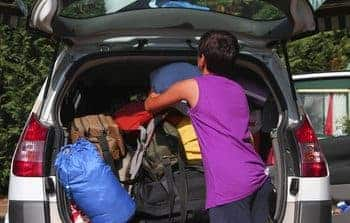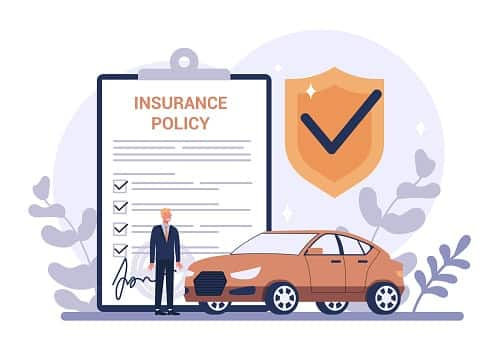Why do college students pay more for car insurance?
College students often face higher car insurance rates than older drivers due to the added risk that comes with their perceived inexperience.
Car insurance rates depend on several factors and one of the most important is your age. Younger drivers, especially those aged 16-25, have more accidents and are less experienced than older ones, so they pay higher premiums.
Saving on car insurance when you'll be away from home
Although car insurance for college students is expensive, there are ways to reduce your premiums. Some will only work if you don't plan to use your car while away, while others can reduce your rates even if you are driving.
These savings tips can also apply to snowbirds and anyone else who is going to be away from home for a long period of time.
Planned non-operation (PNO)
 Some states allow drivers to designate a car as "planned non-operational," or PNO, if it won't be driven for a period of time, such as three to six months or longer.
Some states allow drivers to designate a car as "planned non-operational," or PNO, if it won't be driven for a period of time, such as three to six months or longer.
Do I need insurance if my car is non operational? No, but you'll have to pay a fee to register the car this way This is the least expensive way to cut auto-related costs -- by avoiding both standard registration and insurance expenses. Be aware that a PNO-designated car cannot ever be driven. In fact, it can't even be towed or parked on public streets, and in some states (such as California), drivers must turn in the vehicle's license plates.
The PNO certification is most appropriate for those who store cars for long periods without driving them. PNO is not a great solution for students or anyone who might need their cars at some point during the year. But, if you travel extensively, own more than one home (and keep vehicles at each location), or go away to college, other strategies let you drive occasionally while still saving money.
Affidavit of non-use
 In some states, you may be able to cancel your auto insurance but maintain your registration by filing an Affidavit of Non-Use (ANU). California, for example, requires that you complete a PNO for your vehicle's registration, then file an ANU to inform the DMV that you have or will be canceling your auto liability insurance and will not be driving the car. In order to begin driving again, you'll have to secure the legally-required minimum coverage and notify the DMV.
In some states, you may be able to cancel your auto insurance but maintain your registration by filing an Affidavit of Non-Use (ANU). California, for example, requires that you complete a PNO for your vehicle's registration, then file an ANU to inform the DMV that you have or will be canceling your auto liability insurance and will not be driving the car. In order to begin driving again, you'll have to secure the legally-required minimum coverage and notify the DMV.
New Mexico's motor vehicle division stipulates that if your vehicle is not being driven, you must submit a completed and signed ANU form annually. Your registration will be reflected as "unknown" for insurance purposes, but you should not incur a penalty as long as you don't drive on New Mexico roads.
Low mileage and pay as you drive discounts
 If you will be driving your car periodically during the year, but not putting on a lot of mileage, consider "pay-per-mile insurance, also called pay-as-you-drive (PAYD) for low-mileage drivers. What constitutes "low mileage" driving? That depends on the auto insurance company, but typically ranges between 2,500 and 10,000 miles per year.
If you will be driving your car periodically during the year, but not putting on a lot of mileage, consider "pay-per-mile insurance, also called pay-as-you-drive (PAYD) for low-mileage drivers. What constitutes "low mileage" driving? That depends on the auto insurance company, but typically ranges between 2,500 and 10,000 miles per year.
Pay-per-mile or PAYD plans usually require your mileage and driving to be monitored. That means allowing some sort of tracking device to be installed on your car or recording your mileage through systems, such as On-Star.
Classic car insurance
 If your car is 25 or more years old and gets only occasional use, you may be able to get a less expensive "classic car" policy. Insurers can charge less because classics are generally driven less and cared for more. Ordinarily, to get a classic car policy, your vehicle must be garaged and not used as your primary mode of transportation. These policies can save up to 45% over insurance for daily drivers.
If your car is 25 or more years old and gets only occasional use, you may be able to get a less expensive "classic car" policy. Insurers can charge less because classics are generally driven less and cared for more. Ordinarily, to get a classic car policy, your vehicle must be garaged and not used as your primary mode of transportation. These policies can save up to 45% over insurance for daily drivers.
Classic car policies actually may limit the number of miles you can drive (and specify that the car be garaged when not in use), so be sure to check the fine print when signing up.
Stored car insurance
 It's smart to retain some amount of coverage for your car, even if you aren't driving it. Comprehensive insurance coverage protects you from losses not related to driving -- like theft or vandalism. Because vehicles are much less likely to be damaged in your garage than on the road, parked or stored car insurance is considerably less expensive than full coverage (meaning both collision and comprehensive coverage).
It's smart to retain some amount of coverage for your car, even if you aren't driving it. Comprehensive insurance coverage protects you from losses not related to driving -- like theft or vandalism. Because vehicles are much less likely to be damaged in your garage than on the road, parked or stored car insurance is considerably less expensive than full coverage (meaning both collision and comprehensive coverage).
Remember if you're storing a vehicle that is financed, your financing company will not allow you to drop down to only comprehensive. It will likely require you to carry both collision and comprehensive on your stored vehicle. You should also be aware that you can't legally drive a car on a stored policy, even to the gas station.
Occasional driver discount
 For college students who leave their car with their parents, it may pay to register it under the parents' names and add it to their policy as a low-mileage vehicle. For this to happen, your parents would need to be listed on the vehicle's title.
For college students who leave their car with their parents, it may pay to register it under the parents' names and add it to their policy as a low-mileage vehicle. For this to happen, your parents would need to be listed on the vehicle's title.
If the insurance policy is in your parents' or guardians' names and you are only driving the car when you come home for breaks, you should be listed on the policy as an "occasional" driver, which accesses your parents' (probably) lower rate while protecting you.
Car insurance discounts for college students
Insurance companies offer discounts for college students. Some carriers offer discounts for completing driver education courses or having good grades in school which could be beneficial if you want to save more money over time.
Good student discount
When you have good grades, it is likely that you are a responsible person. As a responsible person, your insurance premiums will be lower, thereby saving you money in the long term.
Driver education discount
One way to save money on car insurance is by taking a driver education course. While the exact discount varies by insurers, a young driver who has completed a defensive driving course may earn a discount on most coverages.
Distant college student discount
When you're studying away from home, you can save money by leaving your car at home and relying on public transportation. As long as the car is still on a parent or guardian's policy, they can list you as a student away from home and get a discounted rate on the insurance.
Navigation system and anti-theft devices
With an intuitive GPS navigation system, you can drive more safely, which in turn allows you to drive more slowly and safely. Also, a car alarm or other anti-theft device can help you save on auto insurance premiums by reducing the risk of theft or vandalism.
Can you cancel your car insurance when you're away from home?
 Never let your coverage lapse without first getting the OK from your state DMV. You could face heavy fines and penalties for having an uninsured car, and it will cost you more to get insurance again after a lapse.
Never let your coverage lapse without first getting the OK from your state DMV. You could face heavy fines and penalties for having an uninsured car, and it will cost you more to get insurance again after a lapse.
If your car is financed, there are other possible penalties. While the state might not care if you drop insurance coverage on a parked car, your auto lender will care a great deal. Once auto insurance companies notify lenders that borrowers are no longer carrying full coverage, lenders can slap on the most expensive coverage. Force-placed insurance, also known as creditor-placed or lender-placed insurance, is purchased by your auto lender and the premiums are added to your monthly payment. It's very expensive and not worth the risk.
It's never a good idea to cancel car insurance without going through the proper channels, and could cost you more than you'll save.






